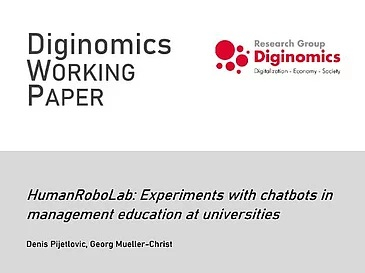Dr. Denis Pijetlovic and Professor Dr. Georg Müller-Christ have published a new working paper under the title "HumanRoboLab: Experiments with Chatbots in Management Education at Universities".
The topic of the working paper is a transdisciplinary chatbot project of the University of Bremenʼs Department of Economics, in the course of which human-machine interaction is being researched in the HumanRoboLab (HRL). So-called "chatbots" are digital dialog systems that represent an application sub-area in automation which is increasingly used in both work and business contexts. The growing use, functionality and benefits of chatbots are therefore also of interest for university teaching in economics. Students at the University of Bremenʼs Department of Economics are developing their own transdisciplinary chatbot project. Working together with partners from different companies within the framework of the HumanRoboLab (HRL), they explore human–machine interaction from an applicationoriented perspective. The main objective of the HRL is to test a didactic concept for transdisciplinary human–machine interaction projects in order to subsequently integrate this concept into business studies and business psychology degree programs. The purpose of such a module is to provide students without prior experience in programming with the knowledge, tools and competences to research, apply and question AI technologies in a self-effective manner; in other words, the HRL aims to help students develop expertise with regard to digitization, benefiting them in both social and economic contexts. The concept of the HRL, as well as some examples of the projects and the role of AI, are outlined in this chapter in order to provide a template for university teachers who might wish to adapt these concepts.
The full article can be accessed here.

